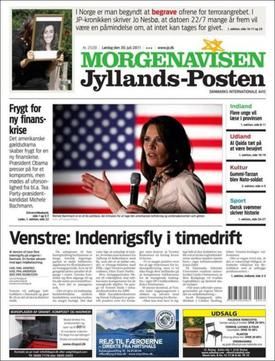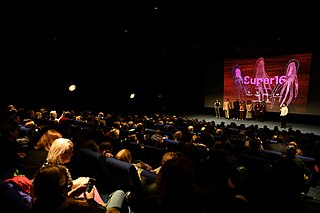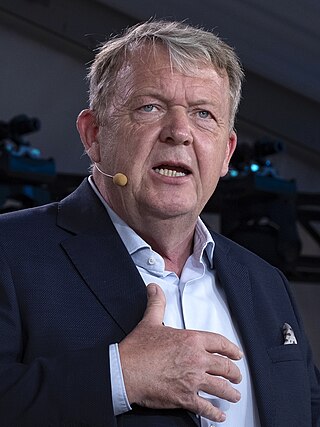Related Research Articles
The Conservative People's Party, also known as The Conservatives is a centre-right political party in Denmark. The party is a member of the International Democracy Union and the European People's Party.

Swan Lee is a Danish indie rock band consisting of singer Pernille Rosendahl, guitarist Jonas Struck and drummer Emil Jørgensen. Swan Lee has released three albums on their own label GoGo Records: Enter (2001), Swan Lee (2004) and The Garden (2023). They have won Danmarks Radio's P3 award, and are particularly known for the singles "Tomorrow Never Dies", "Love Will Keep You Warm" and "I Don't Mind".
David Richard Gress is a Danish historian, known for his 1998 survey From Plato to Nato on Western identity and grand narratives.

Danfoss is a Danish multinational company, based in Denmark, with more than 41,928 employees globally. Danfoss was founded in 1933 by engineer Mads Clausen.

Morgenavisen Jyllands-Posten, commonly shortened to Jyllands-Posten or JP, is a Danish daily broadsheet newspaper. It is based in Aarhus C, Jutland, and with a weekday circulation of approximately 120,000 copies.
Peter Kurrild-Klitgaard, is a Danish political scientist with a particular interest in public choice analysis and classical liberalism.
Instituto Liberdade do Rio Grande do Sul is a Brazilian independent think tank, formed by intellectual entrepreneurs, based in Porto Alegre. Instituto Liberdade is not endowed and does not accept government funding. All of its programs depend upon the generosity of foundations, individuals, and corporations that share belief in the importance of independent research.
The Liberal Alliance is a classical liberal and right-libertarian political party in Denmark. The party is a component of the centre-right bloc in Danish politics. The party's platform is based upon economic liberalism, promotion of tax cuts and reduction of welfare programmes, and a critical, oppositional stance towards European integration.

General elections were held in Denmark on 15 September 2011 to elect the 179 members of the Folketing. Of those 179, 175 members were elected in Denmark, two in the Faroe Islands and two in Greenland.

Danish nationality law is governed by the Constitutional Act and the Consolidated Act of Danish Nationality. Danish nationality can be acquired in one of the following ways:
Lars Hedegaard is a Danish author, historian, editor, journalist and critic of Islam. He established the International Free Press Society in 2009, an extension of the Danish Free Press Society founded in 2004, of which he served as chairman until 2014. Hedegaard was the subject of an assassination attempt in 2013, after which he has lived under police protection.

Super16 is a Danish non-traditional film school based at the Nordisk Film Studio in Valby, Copenhagen. The name of the school refers to both the economical Super 16 mm film gauge, and to the number of participants in each class: 6 directors, 6 producers and 4 screenwriters. Each class program is for a 3-year period and produces 6 films annually. Although English-speaking applicants can apply, all instruction and communication is held in Danish.

Olga Sofia Ravn is a Danish poet and novelist. Her works have received international critical acclaim. She is also a translator and has worked as a literary critic for Politiken and several other Danish publications.

The Alternative is a green and pro-European political party in Denmark. The party was publicly launched on 27 November 2013 by former Minister of Culture Uffe Elbæk and Josephine Fock; Elbæk had been a parliamentarian for the Social Liberal Party. Elbæk was the leader of the party until February 2020, where he stepped down and was succeeded by Fock. Currently the party is led by Franciska Rosenkilde. It collaborates with DiEM25 at the European level.
Martin Ågerup is a Danish economist who founded and served as the first president of the think tank CEPOS from 2004 to 2023. He is a Fellow of the International Policy Network.
Jacob Jomo Danstrøm Mchangama is a Danish lawyer, human-rights advocate, global expert within free speech and social commentator. He is the founder and director of Justitia, a Copenhagen-based think tank focusing on human rights, freedom of speech, and the rule of law. For six years he served as chief legal counsel at CEPOS.

Rasmus Paludan is a Danish-Swedish politician and lawyer, who is the founder and leader of the Danish political party Stram Kurs. Paludan has become known for his extremist views, including that Islam should be banned and that non-Western citizens should be deported from Denmark. He is considered by political scientists and media to be far-right and a right-wing extremist.

Christoffer Harlang is a Danish architect, designer and author and professor at the Royal Danish Academy of Fine Arts, School of Architecture.

The Moderates is a liberal political party in Denmark founded by former Prime Minister and current Minister of Foreign Affairs Lars Løkke Rasmussen. He announced the name in a foundational speech on 5 June 2021. At the same time, he said that his main scenario was that the party would be formed after the 2021 Danish local elections. The name was, according to Rasmussen, inspired by the fictitious Prime Minister Birgitte Nyborg's party Moderaterne in the hit political TV drama Borgen as well as the Swedish Moderate Party, the then–second largest party in the Swedish Riksdag. The Moderates' political position is referred to as centre to centre-right.
Mads Lundby Hansen was a Danish economist, liberal debater and chief economist at the think tank Cepos.
References
- ↑ "Virk Data". Danish Business Register (CVR). Retrieved 14 January 2014.
- ↑ Carlsen, Signe Rugholt (30 October 2009). "Efterlyses: Venstreorienteret tænketank med penge og power". Information (in Danish). Retrieved 14 January 2020.
- ↑ "Socialminister fortier post i Cepos". DR (in Danish). 10 March 2010. Retrieved 15 January 2020.
- ↑ "Cepos fyrer topchef og henter erstatning i Dansk Erhverv". Altinget.dk. 30 September 2023. Retrieved 19 December 2023.
- ↑ "Berlingske Nyhedsmagasin nr. 26 2007 'CEPOS sidder på den offentlige mening'AERF". bny.dk. Archived from the original on 13 January 2008. Retrieved 10 July 2020.
- ↑ "Level of Economic Freedom". Free the World. Archived from the original on 12 December 2011. Retrieved 13 December 2011.
- ↑ "International Property Rights Index". www.internationalpropertyrightsindex.org. Archived from the original on 9 March 2007. Retrieved 15 January 2020.
- ↑ "CEPOS AKADEMI". CEPOS. Retrieved 13 June 2022.
- ↑ Amalie Holstein, Mia (22 September 2018). "Cepos-chef til vækstkritiker: »I min verden er nulvækst en utroligt skræmmende tanke«". Politiken. Retrieved 18 April 2020.
- ↑ Sørensen, Peter Birch (26 September 2018). "Økonomiprofessor til Cepos-chef: Du undervurderer klimakrisens omkostninger. De er ekstremt svære at forudsige noget om". Politiken. Retrieved 18 April 2020.
- 1 2 Friis Lund, Jens (14 April 2020). "Klimaskepsis 2.0: Sådan nedvurderer 'eksperter', debattører og politikere klimaudfordringen". Videnskab.dk. Retrieved 18 April 2020.
- ↑ Voldsgaard, Asker (2 March 2020). "Økonom advarer mod klimatrivialisering: Hvis den breder sig, kan opbakning til klimalovens målsætning let fordampe". Politiken. Retrieved 18 April 2020.
- ↑ "Atlas Economic Research Foundation press release". atlasusa.org. Archived from the original on 17 September 2008. Retrieved 1 August 2008.
- ↑ James G. McGann (Director) (4 February 2015). "2014 Global Go To Think Tank Index Report" . Retrieved 14 February 2015.